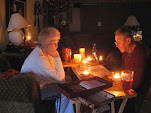
Recently I joined a group of Parkinson's patients to have my DNA sequenced. Normally this costs $299.00, but thanks to funding from the co-founder of Google, Sergei Brin, we were only charged $25.00. The purpose is to find if there are any common genetic markers in Parkinson's sufferers.
I received what they delicately labeled a "spit kit" in the mail, drooled into it and sent it off by Fed Express to" 23 and Me," a genetics lab. About a month later my results came back.
I found that my genes show that my Parkinson's wasn't inherited, so I probably acquired it by inhaling bug spray or laquer thinner or God knows what else over the last 70 years. Along with scads of data, there was a section on maternal and paternal chromosomes and family prehistory. It seems that mom's side of my DNA shows a pretty common group of Europeans originating in Scandinavia. However, when I looked at the paternal, Y Chromosome side I found this:
Haplogroup R1b1c9
Your Y chromosome DNA determines your paternal haplogroup.
Today R1b1c9 is found mostly on the fringes of the North Sea in England, Germany and the Netherlands, where it reaches levels of one-third. That distribution suggests that some of the first men to bear the haplogroup in their Y-chromosomes were residents of Doggerland, a real-life Atlantis that was swallowed up by rising seas in the millennia following the Ice Age.
Doggerland was a low-lying region of forests and wetlands that must have been rich in game; today, fishing trawlers in the North Sea occasionally dredge up the bones and tusks of the Mastodons that roamed there. Doggerland had its heyday between about 12,000 years ago, when the Ice Age climate began to ameliorate, and 9,000 years ago, when the meltwaters of the gradually retreating glaciers caused sea levels to rise, drowning the hunter's paradise. Doggerland's inhabitants retreated to the higher ground that is now the North Sea coast.
Dogger what? The lost continent of Doglantis? Truly, I could never have dreamed up a weirder family history.

No comments:
Post a Comment